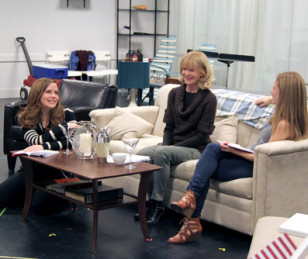Rapture, Blister, Burn is a smart, funny play that deals with three people who are brought together fifteen years after being in graduate school together. Catherine Croll (Michelle Six) has moved from New York City to take care of her elderly mother, Alice (Helen Hedman) who has suffered a heart attack. Catherine is a professor who writes and teaches on feminism and pornography. Her subject matter, combined with her good looks, has made her something of a highbrow media darling.
Gwen Harper (Beth Hylton) is a stay-at-home mother of two boys, ages fourteen and four. The final member of this trio is Gwen’s husband, Don (Tim Getman), a college dean who has arranged for Catherine to take a position at his college during her sabbatical. He is something of a loser: a pothead, a drunkard, and a consumer of Internet pornography. In what is perhaps an intentional irony, Mr. Getman is much taller than the other cast members while his character’s character is much smaller.
Gwen and Catherine envy each other’s lives. Gwen dreams of completing her graduate degree, and Catherine of finding the right man. We eventually learn that this mutual envy is intensified by their shared passion for Don.
This combination of romantic triangle and road-not-taken plot could easily lead to cliche, but it does not, because the three main characters are complicated and fully drawn. Even the Harpers’ babysitter, Avery Willard (Maggie Erwin), a morally coarse twenty-one year old college student and would-be filmmaker, who is almost purely a comic figure, does not become the cartoon she easily might, and for this the credit belongs to Miss Erwin.
Shirley Serotsky’s direction is unfussy; the acting is uniformly fine, but I would especially remark upon—in addition to Miss Erwin—Miss Six. Her performance is rather understated throughout most of the play, which makes its change in register in the latter portion all the more effective.
With its concerns for the roads individual lives take and the conflicting emotions people feel toward one another, there is an intellectual level to the play, even if the movements of the passions ultimately matter more. The intellectuality, moreover, does not lead to didacticism. The play does not seem to me to have any thesis it is trying to prove or convince the audience of. Only those deaf to the the many ironies of the play could see Rapture.Blister, Burn as a paean to feminism or its opposite. Although the play is largely comical, the emotions on display are respected.
This play, in fine, is a wry look at feminism, romantic love, and the way human life unfolds and human beings’ attempts to come to terms with it. Playwright Gina Gionfriddo has provided quite an entertaining brew, and Round House Theatre has given it a production worthy of it.
Rapture, Blister, Burn is being performed through February 22, 2015, at the Round House Theatre in Bethesda Maryland (suburban Washington).


